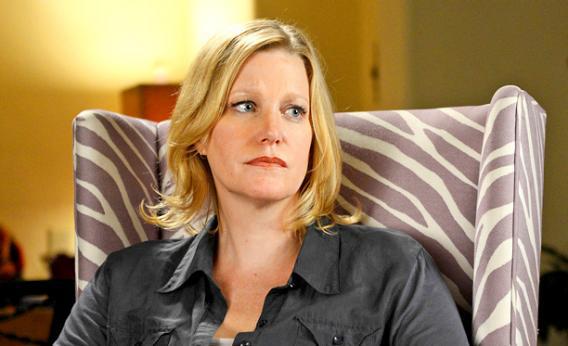On AMC’s Breaking Bad, Skyler White (Anna Gunn) plays many roles: the wife of Walt, the show’s meth-cooking, empire-seeking chemist; the barrier protecting her children from said chemist; the on-screen anchor for our (hopefully strong) sense of morality, which can seem to drift from us as we identify with her husband’s malignant ambitions.
But if you ask the nearly 8,000 people who have liked the Facebook page “I Hate Skyler White,” or the nearly 30,000 who, as Laura Bennett notes, have liked the “Fuck Skyler White” group, then she may seem to be, more than any of those other things, “a shrieking hypocritical harpy who goes ballistic if people don’t kowtow to her every whim, desire and ever-changing moral structure,” as someone on the former page recently put it. That assessment is, of course, shamefully ignorant—isn’t it actually a description of Walt?—but it is representative of an overwhelming and misogyny-tinged distaste for Skyler among certain fans of the show, which Alyssa Rosenberg wrote about for Slate last summer. Tellingly, Rosenberg’s defense of Skyler elicited the exact comments it spoke out against. “She is actually making my Husband hate the show,” one reader wrote, “and this makes it hard. I remain loyal to Jesse, but I wish Walter would rid himself of his strayed wife, she’s holding him down.”
The Skyler haters don’t want to hear it, so I’m just going to let it out: Skyler is the best character on Breaking Bad. Yes, Jesse’s as smart and loveable as a newborn baby dolphin, and Mike seemed at times a vision of what an older, more sympathetic Walt might have been had things gone differently—we sensed his sense of rules and limitations, however deformed it was. But Skyler is the best character on the show because she’s the one who reminds us that it’s necessary to loathe Walt. She is our moral grounding. “People are griping about Skyler White being too much of a killjoy to her meth-cooking, murdering husband?” Vince Gilligan, the show’s creator, said in an interview this March with Vulture. “She’s telling him not to be a murderer and a guy who cooks drugs for kids. How could you have a problem with that?”
Breaking Bad is filled with despicable characters. Emily Nussbaum observed in The New Yorker last summer that “Gilligan has made several clever gambits to keep the show watchable, including swivelling background characters into the spotlight, where they can absorb the sympathy we once extended to Walt.” Skyler, who at the show’s beginning exuded a pedantic conception of right and wrong, stepped easily into that spotlight because of her own willingness to break—or maybe just bend—bad.
Many point to Skyler’s affair with Ted Beneke or her decision to launder Walt’s money as her fall from the moral high ground. But we first see her stumble at the end of Season 1, when she and Walt attend a school meeting about the missing chemistry equipment. Under cover of the table, Walt begins to slide his hand up her leg, and at first she stops him. Then she relents, and the scene cuts to the parking lot: They are parked next to a police car, sharing an intimate moment in Walt’s car. “Where did that come from?” Skyler asks afterward. “And why was it so damn good?” “Because it’s illegal,” Walt says. He has awakened in her a willingness to cross the line of the law—but that awakening may actually give her strength to overcome him.
Skyler is Walt’s only equal. She may not possess superior tactical acumen; her plan to vacate Walt’s dirty money by giving it to Ted backfires completely, and she calls herself a “coward” because she “doesn’t know” how to escape the life Walt’s forced on her. But she is the character most capable of making Walt vulnerable. Only she can completely undermine his rationalizations and expose to him his true reasons for choosing to break bad, which he evidently doesn’t understand himself.
In the episode “Fifty-One,” after Skyler’s false suicide attempt (she wades into the backyard pool in an effort to convince Hank and Marie to take the kids out of the house), Walt tells her, “You made a mistake, and things got out of control, but you did what you had to do to protect your family. And I’m sorry, that doesn’t make you a bad person. It makes you a human being.” Skyler erupts: “I don’t need to hear any of your bullshit rationales. I’m in it now. I’m compromised. But I will not have my children living in a house where dealing drugs and hurting people and killing people is shrugged off as ‘shit happens!’”
It’s easy to get pulled into the show’s narrative logic—Walt must overcome obstacle A to achieve goal B—to the point of blinding oneself to the evil of the particulars and their endpoint. We root for Walt because we want the show to continue. With the series’ final episodes at hand, our support dissolves—our desire to see Walt succeed in the short-term will turn into an eagerness to see him get his comeuppance. And Skyler will be there to remind us that he deserves it.
